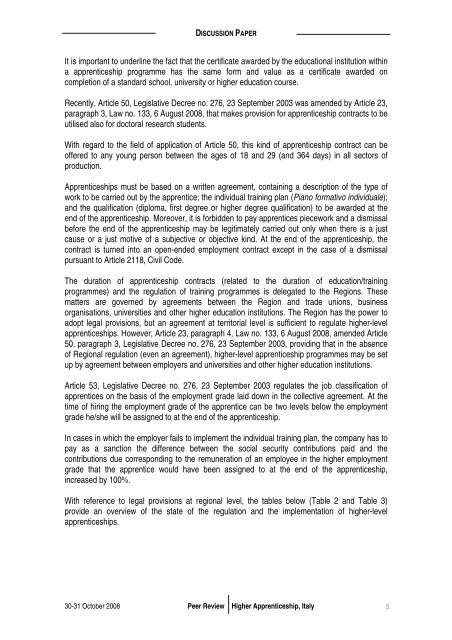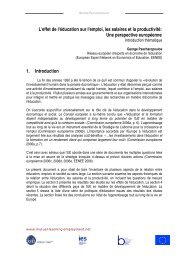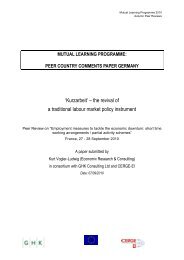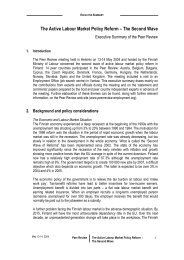Discussion Paper - Mutual Learning Programme
Discussion Paper - Mutual Learning Programme
Discussion Paper - Mutual Learning Programme
Create successful ePaper yourself
Turn your PDF publications into a flip-book with our unique Google optimized e-Paper software.
DISCUSSION PAPER<br />
It is important to underline the fact that the certificate awarded by the educational institution within<br />
a apprenticeship programme has the same form and value as a certificate awarded on<br />
completion of a standard school, university or higher education course.<br />
Recently, Article 50, Legislative Decree no. 276, 23 September 2003 was amended by Article 23,<br />
paragraph 3, Law no. 133, 6 August 2008, that makes provision for apprenticeship contracts to be<br />
utilised also for doctoral research students.<br />
With regard to the field of application of Article 50, this kind of apprenticeship contract can be<br />
offered to any young person between the ages of 18 and 29 (and 364 days) in all sectors of<br />
production.<br />
Apprenticeships must be based on a written agreement, containing a description of the type of<br />
work to be carried out by the apprentice; the individual training plan (Piano formativo individuale);<br />
and the qualification (diploma, first degree or higher degree qualification) to be awarded at the<br />
end of the apprenticeship. Moreover, it is forbidden to pay apprentices piecework and a dismissal<br />
before the end of the apprenticeship may be legitimately carried out only when there is a just<br />
cause or a just motive of a subjective or objective kind. At the end of the apprenticeship, the<br />
contract is turned into an open-ended employment contract except in the case of a dismissal<br />
pursuant to Article 2118, Civil Code.<br />
The duration of apprenticeship contracts (related to the duration of education/training<br />
programmes) and the regulation of training programmes is delegated to the Regions. These<br />
matters are governed by agreements between the Region and trade unions, business<br />
organisations, universities and other higher education institutions. The Region has the power to<br />
adopt legal provisions, but an agreement at territorial level is sufficient to regulate higher-level<br />
apprenticeships. However, Article 23, paragraph 4, Law no. 133, 6 August 2008, amended Article<br />
50, paragraph 3, Legislative Decree no. 276, 23 September 2003, providing that in the absence<br />
of Regional regulation (even an agreement), higher-level apprenticeship programmes may be set<br />
up by agreement between employers and universities and other higher education institutions.<br />
Article 53, Legislative Decree no. 276, 23 September 2003 regulates the job classification of<br />
apprentices on the basis of the employment grade laid down in the collective agreement. At the<br />
time of hiring the employment grade of the apprentice can be two levels below the employment<br />
grade he/she will be assigned to at the end of the apprenticeship.<br />
In cases in which the employer fails to implement the individual training plan, the company has to<br />
pay as a sanction the difference between the social security contributions paid and the<br />
contributions due corresponding to the remuneration of an employee in the higher employment<br />
grade that the apprentice would have been assigned to at the end of the apprenticeship,<br />
increased by 100%.<br />
With reference to legal provisions at regional level, the tables below (Table 2 and Table 3)<br />
provide an overview of the state of the regulation and the implementation of higher-level<br />
apprenticeships.<br />
30-31 October 2008 Peer Review Higher Apprenticeship, Italy<br />
5





